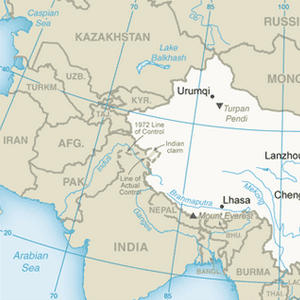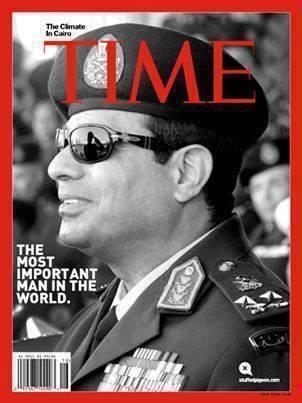Yesterday in a post about the Uighurs wrongfully detained in Guantanamo Bay for over a decade, I made an allusion to U.S. Cold War policies toward anti-colonial movements in developing nations, which I want to explore further today:
And the United States in particular needs to stop lumping together every rural Muslim male with a gun as an “Islamic terrorist.” It’s not a helpful approach to the conflicts from southeast Europe to northwest China and everywhere south of that (including much of Africa now). It’s just as bad as our refusal to make nuanced distinctions among different Communist-affiliated nationalist independence movements in Africa and Asia during the Cold War.
[…]
We’ve heard this before, after World War II, when the United States decided to fight pro-American independence groups like the Viet Minh because of their Communist alignment, instead of embracing fellow anti-colonialists.
In hindsight, many American intellectuals can see that there were alliances to be made, which we rejected to our detriment. But even today, a lot of people — particularly on the conservative end of foreign policy — are still refusing to make the distinctions.
We saw this come up a few weeks ago in discussions over the legacy of Nelson Mandela. The Cold War mentality produced a lot of tangled, unlikely, and unfortunate alliances all around, for both the Americans and the Soviets. Nelson Mandela, while not a communist himself, was willing to work with communists who shared his core principles of anti-colonialism, anti-imperialism, and often (but not always) a unitary nationalism.
The United States ought to have joined in that approach, rather than siding with the crazed white supremacist regime that Mandela was resisting. But we couldn’t see past the communist involvement in the movement.
Why communism?
The reality of the situation in much of the developing world after World War II was that the communists were often the best organized members of the wider nationalist independence movements in those nations. And their affiliation with the independence movements — while sort of contrary to original Marxian views that all borders, boundaries, and national divisions were lies intended to divide the global working classes and turn them against each other — was not a huge surprise, given the influences of Lenin on 20th century communism around the world.
Lenin, the founding father of the Soviet Union, certainly had a range of terrible policies as a leader. But before he became a dictator, he was a key contributor to communist theory.
Perhaps his biggest contribution was toward explaining the merger of colonial economics and political imperialism. When other thinkers were still purely obsessed with overthrowing industrial governments in Europe, Lenin was actually raising pointed criticisms of colonialism and explaining how the extractive relationship was harming poor and working class people both in the colonized and colonizer nations.
(The low-cost or enslaved labor of colonized nations, Lenin felt, had made possible the manufacture of so many cheap goodies back home in the colonial powers that The People in those countries were content enough not to rise up. He further argued that colonialism was just one tool of a global financial system geared toward big business capitalism and that it provided the cheap, raw resources necessary to fuel the wealth accumulation of the industrialists’ growing mega-companies. Lenin wanted to cut the legs out from under the big capitalists and spur their European workers to rise up, and neither development was helping.)
So the Soviet Union, despite what was essentially its own colonization of the outer periphery of the former Russian Empire, ended up expending a lot of energy and resources in aiding independence movements in developing regions. The deal was that you would get help in exchange for becoming a communist and pledging to support the Soviet Union.
And so it was that many activists in the developing world joined communist movements out of a sense that Lenin’s theories and Soviet assistance offered the best route to political and economic independence for their home countries.
More broadly, they also saw communism as a way toward a more egalitarian and inclusive society than the divide-and-conquer political strategies of the occupying powers and the economic inequality they were fostering as they created ruling elites, whether white or native.
The Soviet Union, while actually quite socially progressive compared to much of the West at the time, was of course deeply flawed in many ways and extremely brutal at times.
But from the perspective of someone already living under a brutal, unequal, and impoverished colonial occupation (or post-colonial system like the apartheid regime in South Africa), it makes sense to consider communism as a way out.
Communism was offering colonized and occupied peoples self-determination, a path toward industrialization, and the promise of widely distributed and improved living standards that were probably higher than what colonialism and apartheid were offering. Even if the improvements communism could achieve might be less than what well-regulated and politically free market-capitalism might have been able to achieve, neither of those — simply put — were on offer under colonial and white supremacist rule. So communism would have looked pretty good at that point.
Rebuffing potential friends
Even so, many communists in emerging nations during their independence and early post-colonial movements actually tried to befriend the United States because they saw it as a freer alternative to following the Soviet model and they believed Americans — who had thrown off mercantilist colonial rule first and held certain truths to be self-evident for all men — would be sympathetic to the struggles of people who wanted freedom from colonialism, national independence, and upward social mobility for all.
Unfortunately, Americans were often too blinded by ideological taxonomies — and, of course, concerns over maintaining business interests of American multinational firms in developing nations. This resulted in classifying everyone as Red or Not-Red, even if that meant opposing friendly movements that identified as predominantly communist during their resistance phase against oppressive colonial and post-colonial regimes.
It also often meant supporting brutally undemocratic regimes who happened to identify as anti-communist, usually because that country’s main national opposition was communist or because pitching one’s self as a guardian of American business and political interests was a convenient means of acquiring military aid to suppress one’s populations.
Nelson Mandela wasn’t communist himself. But in the communists, he saw brothers-in-arms who shared many of the same beliefs and were willing to help oppose the apartheid regime of the Afrikaner white minority rulers. The United States was ambivalent toward the regime at the best of times and actively refused to oppose the apartheid government at the worst of times.
Rather the criticizing these past associations as we consider the passing of Mandela, Americans should reflect on how ideological blinders have warped our global relations in past eras and what we can do to ensure we are helping the right people and not helping the wrong people in future.
The more we provide help to those who need it and the less we offer aid and comfort to oppressive regimes, the less likely people will be to join radical and violent movements or to associate with movements and ideologies we consider harmful.
The United States must lead by example, not lecture, and must help economically and politically oppressed populations wherever we can.
The challenge today
With the end of the Cold War and the fizzling of many of the remaining “communist” movements in the developing world, “communism” is no longer the source of dangerous American foreign policy conflations. These days, as I suggested in my earlier post, the United States needs to do a better job of making distinctions between resistance movements that use political Islam as a convenient and unifying force against their oppressors or poor living conditions (but which do not pose a threat to the United States and likely don’t even oppose us) and those movements that use an extremist twisting of Islam as part of a delusional plan for a “global caliphate” or whatever.
The latter are angry, unemployed young men who have heard too many conspiracy theories explaining their circumstances and just want to watch the world burn. The former are also dissatisfied with present conditions and see the organized structure and shared identity of political Islam as a means of reorganizing a society away from corrupt and failed rule that benefits a few and toward a system that distributes benefits to the needy and provides basic social services as well as law and order. Some in that category also see a need to incorporate the militarism of early Islam as a motivating force to overthrow the status quo whether it derives from bad local/domestic leadership, a distant and unrepresentative central government (as in Russia or China), or foreign occupation. But this doesn’t automatically mean anti-Western/anti-American views. It’s just one type of response to local conditions.
We shouldn’t be the arbiters of the right to armed resistance oppression, but we do need to recognize who is resisting their oppressive local circumstances — poverty, corruption, occupation, inequality, dictatorship — and isn’t just trying to burn down everything for the sake of it. Between alienating moderate Islamist political parties and frequently blowing up civilians accidentally in predominantly Muslim nations because they might be near someone with a gun, we’re doing pretty badly on that front right now. And again, we don’t need to arbitrate the issue of whose armed resistance is most legitimate if we are pursuing policies that support liberation of all oppressed populations and encourage non-violent solutions.
Unlike with the past “threat” of “global communism,” there are way more people today who identify as Muslim than those who identified as communist at its peak. Learning to employ and display a nuanced understanding of who the real enemies are — the dangerous radicals who seek global revolution, chaos, and general violence — will be crucial to earning trust and good will from a large portion of the planet, whether they live under oppressive or free governments.



 In 2001, during the opening weeks of the War in Afghanistan, the United States military — partly coming in alongside Taliban arch-rivals the “Northern Alliance” — got to experience firsthand the deeply complex and fluid border regions of (and surrounding) northern Afghanistan, which are far more vaguely defined in reality than on maps. The wider region remains home to a multitude of different ethnic groups, religions, languages, and cultures. Some of these populations are still semi-nomadic and many, at the very least, don’t constrain themselves reliably to the modern borders of the countries.
In 2001, during the opening weeks of the War in Afghanistan, the United States military — partly coming in alongside Taliban arch-rivals the “Northern Alliance” — got to experience firsthand the deeply complex and fluid border regions of (and surrounding) northern Afghanistan, which are far more vaguely defined in reality than on maps. The wider region remains home to a multitude of different ethnic groups, religions, languages, and cultures. Some of these populations are still semi-nomadic and many, at the very least, don’t constrain themselves reliably to the modern borders of the countries.  And now we arrive at the second argument, that the first amendment is being violated by suspending this man for his vile comments. This is, simply put, mind-bogglingly idiotic.
And now we arrive at the second argument, that the first amendment is being violated by suspending this man for his vile comments. This is, simply put, mind-bogglingly idiotic.